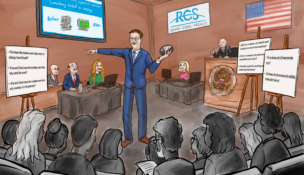Rocker v. USAA Casualty, et al.
By: dmc-admin//December 3, 2007//
Special damages: past medical expenses: $135,694; past wage loss: Contested issue; plaintiff argued past wage loss somewhere in the neighborhood of $250,000-$300,000; defendant argued past wage loss was somewhere between $30,000 and $80,000; future medical expenses: $35,787; future loss of earnings: Plaintiff argued there was a number of different ways that future loss of earning capacity could be computed. Plaintiff suggested loss of future earnings any where from $700,000 to over $1 million. Defendant argued there was no future loss of earning capacity.
Date of accident: Feb. 3, 1999
Plaintiff’s attorney: Timothy Trecek, Habush, Habush & Rottier S.C., Milwaukee
Defendant’s attorney: Jackie Frakes represents USAA Casualty, Eiche & Frakes, Milwaukee; James Ratzel represents General Casualty for Worker’s Compensation, Ratzel & Associates, Brookfield, Wisconsin
Plaintiff counsel’s summary of the case: Glen Rocker was injured while working at a car wash when a co-employee negligently drove a customer’s car, causing it to strike plaintiff.
General Casualty Company of Wisconsin issued a commercial general liability insurance policy to Rocker’s employer. USAA Casualty issued two insurance policies to the customer.
The circuit court relied on a provision in the General Casualty policy that precluded coverage for a co-employee and ruled that General Casualty did not provide coverage to Rocker’s co-employee. The circuit court relied on Wis. Stat. §632.32(5)(b) and policy provisions permitted by that statute and ruled that USAA Casualty provided coverage to the co-employee, but only in limits of $25,000, the amount under Wisconsin Financial Responsibility law. Initially, the co-employee claimed the car involved had a sudden and uncontrollable acceleration. Ford was initially named as a defendant but was dismissed by plaintiff shortly after the case started.
Plaintiff’s negligence theory: Negligent operation of a motor vehicle
Defendants’ negligence theory: Stipulated to negligence
Noteworthy issues: For a case to go to trial 9 years after the date of the accident is somewhat unique. In the trial court, there were insurance coverage decisions that held that there was no coverage for Mr. Rocker’s injuries. Plaintiff’s counsel appealed those decisions and the court of appeals certified the issue to the Supreme Court. The case was argued in front of the Supreme Court and, ultimately, the Supreme Court held that a car wash does satisfy the definition of “motor vehicle handler” under Wis. Stat. §632.32(6)(a). Therefore, the Supreme Court held that General Casualty could not exclude coverage under the commercial general liability policy of the car wash, for the negligence of plaintiff’s co-employee, who was driving a customer’s car at the time of the accident.
Additionally, there was disagreement as to whether or not plaintiff had sustained any kind of loss of future earning capacity. Prior to the accident, plaintiff was making $7.00 per hour at the car wash as well as making a certain percentage of the profits of the car wash.
Shortly after his accident, the car wash was making very little, if any profit and, defendant argued that since plaintiff’s post-accident earning capacity was approximately $9.00 per hour, there was no loss of earning capacity claim. The jury ultimately awarded over $317,000 for past lost wages and future earning capacity loss.
Legal News
- Chicago man sentenced to prison after being caught with ‘Trump Gun’
- FTC bans non-competes
- Gov. Evers seeks applicants for Dane County Circuit Court
- Milwaukee man charged in dismemberment death pleads not guilty
- Democratic-led states lead ban on the book ban
- UW Madison Professor: America’s child care crisis is holding back moms without college degrees
- History made in Trump New York trial opening statements
- Prosecutor won’t bring charges against Wisconsin lawmaker over fundraising scheme
- Republican Wisconsin Senate candidate says he doesn’t oppose elderly people voting
- Vice President Harris to reveal final rules mandating minimum standards for nursing home staffing
- Election workers fear threats to their safety as November nears
- Former law enforcement praise state’s response brief in Steven Avery case
WLJ People
- Power 30 Personal Injury Attorneys – Russell Nicolet
- Power 30 Personal Injury Attorneys – Benjamin Nicolet
- Power 30 Personal Injury Attorneys – Dustin T. Woehl
- Power 30 Personal Injury Attorneys – Katherine Metzger
- Power 30 Personal Injury Attorneys – Joseph Ryan
- Power 30 Personal Injury Attorneys – James M. Ryan
- Power 30 Personal Injury Attorneys – Dana Wachs
- Power 30 Personal Injury Attorneys – Mark L. Thomsen
- Power 30 Personal Injury Attorneys – Matthew Lein
- Power 30 Personal Injury Attorneys – Jeffrey A. Pitman
- Power 30 Personal Injury Attorneys – William Pemberton
- Power 30 Personal Injury Attorneys – Howard S. Sicula








